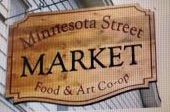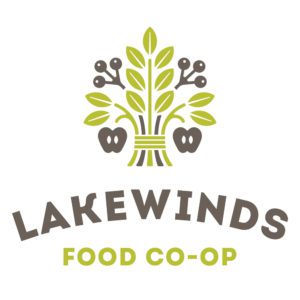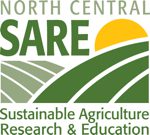Annual Conference Sessions & Features 2024

The Night Before Social
Minnesota Street Market
27 W Minnesota Street, St. Joseph, Minnesota 56374
Friday, February 9, 2024 6:30 - 8:00 p.m.
All are welcome for informal social time at the food and art co-op that's a couple of blocks from the conference site.
We'll provide grass-fed beef chili, corn chowder and bread, and you can buy drinks, chips, dips, snacks to share there at the co-op. And you may bring wine or beer to share as well.
Feel free to bring musical instruments, and we'll see if a jam materializes.
Free admission. Even if you can't attend the Annual Conference, you are welcome at this event.
Parking: There is another large event on the St. Ben's campus on the day of our conference, so we recommend that you allow time to find good parking.
Map of Guest Parking and Sidewalk Routes to the Conference Center (PDF)
Conference Kids Program 9:20a.m. - 4:20 p.m.
Thie feature is sold out - NO WALKUPS, please!
Drop-off is at 9:20 after the Opening Plenary Session.
They will join you for lunch, which is on-your-own, including bring-your-own, or you can get a caterer ticket with your registration.
You will pick up your kids at 4:30 p.m.
Children under 5 are free and welcome at the Conference, but are the responsibility of their parents.

Farm & Food Book Swap
Upstairs Elevator Lobby
Do you have some farming books collecting dust? Looking to get a jump on spring cleaning? Bring them with you to the conference and stop by the book swap table! There you can pass your books forward to other growers and to find some new-to-you reads to take home.
SCION
SWAP
Fruit growers: Try out new varieties from scions at the Scion Swap, and bring some fresh ones from home to share. Tree species can include apple, pear, plum, cherry, apricot, peach, or any fruit tree you can grow, plus plants like elderberry or currants. Please keep all cuttings wrapped and cool to protect their viability.
How to Sell More at Farmers Markets (201)
Dan Zimmerli, Cedar Crate Farm, SFA Specialty Crops Lead (201)
Vending at Farmers Markets can be a lot of work but can also be very rewarding. Farmers Markets offer a relatively low cost way to get your farm in front of a large audience, and can be a great source of farm revenue. In this session Dan will go through proven strategies to increase your sales at farmers markets. He’ll talk about stall setup strategies, product arrangement, customer flow, ways to capture customer information, and other marketing strategies you can use to increase your sales.
Time Management for Farmers: Maximizing Your Mindset & Profits (201)
Rachelle Meyer, Wholesome Family Farms
Transform your farming operation using mindset management with techniques tailored for agriculture, allowing you to prioritize tasks, embrace technology, and adapt to seasons efficiently. Rachelle Meyer, a business and mindset coach for farmers has hands-on experience in regenerative agriculture and direct-to-consumer sales. She,her husband and 7 kids farm over 700 acres, and this session focuses on the practical techniques that they successfully apply on their farm.
Understanding Biological Soil Tests for Assessing Soil Health: Haney, PLFA, and TND (201)
Kent Solberg, SFA Senior Technical Advisor
Soil biology is the primary driver of nutrient cycling and the ability of the soil to capture and store water. Lab analysis of soil biology can provide important insights into how your soil is responding to management. Learn how to read and understand PLFA, Haney, and other assessments to provide insights to help you become a better manager in your soil health journey.
A New Opportunity – The Climate Smart Seedlings Production Network (101)
Mary Hammes, Reforestation Strategy Manager, The Nature Conservancy
David Abazs, Northeast Executive Director, Regional Sustainable Development Partnerships
Tyler Carlson, Silvopasture & Agroforestry Project Lead, SFA
Moderator: Lucinda Winter, SFAS Executive Director
Soil Health for Diversified Vegetables: What We Learned from 100 Farms (201)
Natalie Hoidal, Unviersity of Minnesota Extension, Local Foods and Vegetable Crops
Erik Heimark, Maple Ridge Produce
In 2023 Extension educators visited 100 Minnesota farms to assess the soil in high tunnels and fields. We looked at nutrients, physical properties, and a variety of soil health metrics, and asked farmers about their soil management practices. Join us to hear about what we learned, and how you can apply soil health principles to your vegetable farm.
If I Knew Then What I Know Now: Wisdom From Seasoned Farmers, Part 3 (101)
Sunny Ruthchild, Merryweather Farm, Walnut Grove
Jules Schoenecker, Gray's Tomatoes, Winsted
Jane Grimsbo Jewett, Willow Sedge Farm, Palisade
Chris Kudrna, Moderator, Plum Creek Garlic, St. Cloud
Chris Kudrna is bringing back this popular session in which he interviews seasoned farmers and growers about their life experience and, as the title suggests, what they might do differently. With audience participation encouraged, this can be an emotional and enlightening time of sharing the wisdom of our sustainable farming community.
Emerging Farmers Networking Session (101)
Hosted by Lillian Otieno, Minnesota Department of Agriculture, Commissioner's Office
Existing and upcoming resources for emerging farmers, and lots of networking time.
Livestock Marketing Success through Knowing the Numbers (301)
George & Anneliese Walker, Walker Farms, Princeton MN
Learn the different types of marketing and why Walker Farms has gone from a direct-to-consumer model to building a fluid cattle herd through sell/buy marketing. George and Anneliese will focus on knowing your numbers when it comes to cost of gain vs value of gain, and realizing that "not all pounds are created equal." George and Anneliese, who both hold degrees in Animal Science, run a mixed operation based around grazing on mostly leased land.
Chilling with Your Garlic (201)
Dr. Cindy Tong, Professor, University of Minnesota Department of Horticultural Science
Dr. Carl Rosen, Professor, University of Minnesota Department of Soil, Water and Climate
Jerry Ford, Moderator, MN Garlic Festival Director
Do you chill your garlic before planting and after harvest? Should you? Does it affect yields? Cindy Tong and Carl Rosen have been working on an NCR-SARE-funded project titled "On farm evaluations of novel methods to increase garlic marketable yield". They are researching the effects of chilling seed garlic prior to planting on garlic yield. They are also examining how different on-farm postharvest storages affect wholesale/retail garlic quality. Results from the studies thus far will be shared.
Farm Profitability: What Is It and How Do I Get It? (101)
Jared Luhman, Grass Fed Cattle Co., SFA Soil Health & Grazing Lead
All farmers strive for profitability in our farm and ranch businesses, yet many operate at a breakeven or even a loss. In this session we’ll define what it means to be profitable, how profit is different from cash flow, and what the three keys are to increasing profitability in our farm and ranch businesses.
Replicable Successes in 'Local' (101)
Mehgan Blair, Canosia Grove Farm & Cidery
Maddy Bartsch, Three Rivers Fibershed
Katie Feterl, Moderator, SFA Communications Director
How can we make "local foods" thrive in our communities without reinventing the wheel? Join in conversation with two Minnesota farmers who implemented different models of of local distribution, promotion, and farmer support to lighten the load and boost collective success.
Mehgan Blair of Duluth, Minn. will share how she and other Northland farmers established the Twin Ports REKO Ring.
Maddy Bartsch, Salt of the North Dyes, co-founded the Three Rivers Fibershed. They will discuss how this regional chapter came to be and what it offers producers across a soil-to-soil fiber sysytem.
Navigating Forage-based Genetics for Profitable Enterprises (301)
Derek Schmitz, Grassrich Dairy, SFA MN Dairy Initiative Coordinator
Jordan Meyer, Wholesome Family Farms
What makes great forage-adapted genetics? Join the discussion about what to look for when selecting seedstock, correct animal phenotype, and how we can influence development through epigenetics. Passionate farmers, Derek Schmitz and Jordan Meyer, specialize in raising 100% forage-fed dairy cattle, beef cattle, goats and other small ruminants for conventional and direct marketing. Their mission is to promote soil health, increase profits, and improve the quality of life for our families and community.
Apple Production Foundations: Considerations and Options for Planning a Sustainable Orchard (101)
Madeline Wimmer, Extension Educator, Food Systems - Fruit Production
Whether you’re looking to focus solely on apple production, compliment what you bring to market, or diversify your fall CSA box, this talk will help build the foundation and science behind planting and growing apple trees. Topics covered include the benefits of growing perennial fruit crops, site preparation, planning for low or high density apple production, and comparing and contrasting cider and dessert/fresh eating apple production.
Pasture as a Profitable Crop (201)
Jared Luhman, Grass Fed Cattle Co., SFA Soil Health & Grazing Lead
For many, pasture is nothing more than the land they are unable to raise crops on, and is often viewed as wasteland. Jared will show examples of different enterprises using a consistent format to compare and contrast methods of generating profit on pastureland. You'll see that it's possible to generate enough income to consider converting tillable acres from crops to pasture. Turns out pasture can be a profitable crop!
Activating Community through
On-Farm Events (201)
Pat Berger, Boreal Bounty Farm, Clover Valley Farm Fest, Two Harbors MN
Bethany Lacktorin, Harvest Star, New London MN
Matt Barthelemy, Project Manager, Come and Get It!, Renewing the Countryside
On-farm community events are a great way to engage and rally folks around local foods. RTC's "Come & Get It Project" trained leaders in nine teams across Minnesota to produce successful on-farm events, and all these groups held just such an event in each of their regions. We'll hear from two of these teams about the challenges and rewards of hosting events that included an array of farmers, growers, makers and other community partners.
How I Got There: Starting my Regenerative Farm (101)
Harv Schoon, Healthy Harvest Farm & Kitchen. Hillman MN
Harv Schoon once owned a large commercial dairy, but in 2020 he pursued a different path of a smaller footprint, regenerative agriculture, direct marketing, and offering tours and education on the farm. If you already have property or are considering leaving the city for a different life of raising food and improving the environment, Harv’s unique perspective – transitioning from industrial ag to a small homestead farm, while still maintaining financial independence – will give you insight and inspiration.






